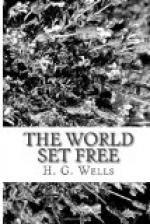a discomfort and disorderliness that was at its best
only picturesque, is at an end. Men spread now,
with the whole power of the race to aid them, into
every available region of the earth. Their cities
are no longer tethered to running water and the proximity
of cultivation, their plans are no longer affected
by strategic considerations or thoughts of social
insecurity. The aeroplane and the nearly costless
mobile car have abolished trade routes; a common language
and a universal law have abolished a thousand restraining
inconveniences, and so an astonishing dispersal of
habitations has begun. One may live anywhere.
And so it is that our cities now are true social gatherings,
each with a character of its own and distinctive interests
of its own, and most of them with a common occupation.
They lie out in the former deserts, these long wasted
sun-baths of the race, they tower amidst eternal snows,
they hide in remote islands, and bask on broad lagoons.
For a time the whole tendency of mankind was to desert
the river valleys in which the race had been cradled
for half a million years, but now that the War against
Flies has been waged so successfully that this pestilential
branch of life is nearly extinct, they are returning
thither with a renewed appetite for gardens laced by
watercourses, for pleasant living amidst islands and
houseboats and bridges, and for nocturnal lanterns
reflected by the sea.
Man who is ceasing to be an agricultural animal becomes
more and more a builder, a traveller, and a maker.
How much he ceases to be a cultivator of the soil
the returns of the Redistribution Committee showed.
Every year the work of our scientific laboratories
increases the productivity and simplifies the labour
of those who work upon the soil, and the food now
of the whole world is produced by less than one per
cent. of its population, a percentage which still
tends to decrease. Far fewer people are needed
upon the land than training and proclivity dispose
towards it, and as a consequence of this excess of
human attention, the garden side of life, the creation
of groves and lawns and vast regions of beautiful
flowers, has expanded enormously and continues to expand.
For, as agricultural method intensifies and the quota
is raised, one farm association after another, availing
itself of the 1975 regulations, elects to produce
a public garden and pleasaunce in the place of its
former fields, and the area of freedom and beauty is
increased. And the chemists’ triumphs of
synthesis, which could now give us an entirely artificial
food, remain largely in abeyance because it is so much
more pleasant and interesting to eat natural produce
and to grow such things upon the soil. Each year
adds to the variety of our fruits and the delightfulness
of our flowers.
Section 9




